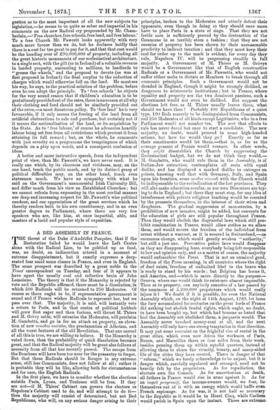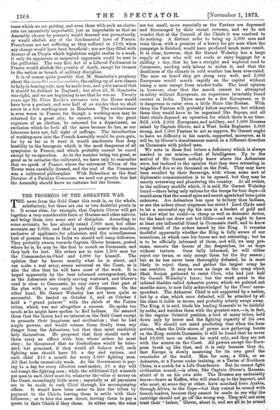A RED ASSEMBLY IN FRA.NCE.
THE threat of the Duke d'Audriffet Pa.squier, that if the Restoration failed he would leave the Left Centre alone with the Radical Lion, to be gobbled up as food, was, no doubt, an indiscretion uttered in a moment of extreme disappointment, but it exactly expresses a deep- seated fear amid some classes in France, and even in England. The same prospect was described by a great noble to the Times' correspondent on Tuesday, and fear of it appears to have upset the usually cool and reflective brain of John Lemoinne. The theory is that if the Monarchy is rejected by vote and the Republic affirmed, there must be a dissolution, in which 500 Radicals will be returned to 250 Moderates. Of course so there ought to be, if representative government is sound and if France wishes Radicals to represent her, but we pass over that. The majority, it is said, will instantly vote a return to Paris, and in that centre of political hubbub will grow first eager and then furious, will thrust M. Thiers and M. Grevy aside, will ostracise the Moderates, will proclaim M. Gambetta, and go in for an attack on property, an eleva- tion of new couches sociales, the proclamation of Atheism, and all the worst features of the old Revolution. That one morsel of all this is true, we are willing to believe. If the Monarchy is voted down, then the probability of quick dissolution becomes great, and that the Radical majority will be great also follows of necessity from all that has recently passed. The escape from the Bourbons will have been too near for the peasantry to forget. But that these Radicals should be Rouges in any extreme sense, still less Communists, does not follow at all ; rather it is probable they will be like, allowing both for circumstances and for race, the English Radicals.
In the first place, we have to consider whether the eleetions outside Paris, Lyons, and Toulouse will be free. If they are not—if M: Thiers' Cabinet can govern the electors as Napoleon's Cabinet used to do, and will attempt to do it— then the majority will consist of determined, but not Red Republicans, who will, on any serious danger arising to their principles, beckon to the Moderates and utterly defeat their opponents, even though in doing so they should once more have to place Paris in a state of siege. That they are not feeble men is sufficiently proved by the destruction of the Commune in so terribly stern a fashion ; that they are not enemies of property has been shown by their unreasonable proclivity to indirect taxation ; and that they must keep their zeal for order up to the mark is evident, for every day they rule, Napoleon IV. will be progressing steadily to full majority. A Government of M. Thiess or M. Grevys would be a Government like that of English constructive- Radicals or a Government of Mr. Fawcetts, who would not suffer either mobs to dictate or Members to break through all economic principles. Such a Government would not be dreaded in England, though it might be strongly disliked, as dangerous to aristocratic institutions ; but in France, where equality and property are the two dominant passions, such a Government would not even be disliked. But suppose the- elections left free, as M. Thiers usually leaves them, what should we have then ? Probably 400 Republicans of a quiet type, 100 Reds scarcely to be distinguished from Communists, and 250 Moderates of all kinds except Legitimists, who in a free Parliament would not number ten. The sect that affects to rule has never dared but once to start a candidate. The new majority, no doubt, would proceed to some high-handed actions, but how far would they go ? Exactly as far as their constituents would let them,—that is, as far as the average peasant of France would venture. In other words, they might disestablish the Church by suppressing the Ecclesiastical budget, but we do not think they would,— M. Gambetta, who would rule them in the Assembly, is of Italian-Jew extraction, contemplates all sects with equal dislike, and has displayed a marked dislike to outrages on priests, knowing well that with Germany, Italy, and Spain upon his frontiers, some modus vivendi with the Church would be indispensable to the revindication of the lost provinces. They will also make education secular, as our own Dissenters are try- ing to do in England ; but there they must stop, for any idea of interference with private religious teaching would be resented by the peasants themselves, in the interest of their wives and daughters. The gradual suppression of monasteries, by a. prohibition of ne* inmates, might be added, but convents for the education of girls are still popular throughout Franoe. Then they would abolish the disgraceful laws which still pro- hibit combination in France, would allow strikes as we allow them, and would secute the freedom of the individual from arrest without a warrant, as it is secured in Switzerland,—an enormous change, which would greatly weaken "authority,' but still a just one. Preventive police laws would disappear as they are disappearing here, everybody being left responsible to law and opinion only, and as a matter of course, the majority would enfranchise the Press. That is not an unmixed good, freedom of the Press meaning, in all countries where the right of duel exists, freedom of unlimited libel to the bravo who is ready to stand by his words ; but Belgium has borne it, and America, and—which is more directly to the purpose— Geneva, where one would think its existence almost impossible. Then as to property, can anybody conceive of a law passed by. the nominees of 5,200,000 proprietors which would really injure it We doubt if it is possible, for even the National Assembly which, on the night of 14th August, 1789, let loose the fury accumulated for centuries on the great lords of France did nothing but abolish feudal rights, which ought, no doubt, to have been bought up, but which had become so hated that had the Assembly not abolished them, a jacquerie would. The Assembly never touched money-rent at all, and the next Assemblywill only have one strong temptation in that direction. It may put some restraint on the frightful rise of rental in the great cities, which even now drives the workmen of Paris, Rouen, and Marseilles three or four miles from their work, besides penning them up within squalid quarters, instead of allowing them to share the vivacity, beauty, and many-sided life of the cities they have erected. There is danger of that "reform," which we freely acknowledge to be unjust, but it is danger which, carefully regulated and arranged, need not be-
heavily felt by the proprietors. As for repudiation, the electors own the Consols. As for amortisation at death, all fathers in France would rise in arms against it. As for an impot progressif, the income-owners would, we fear, lie- themselves out of it with an energy which would baffle even French espionage. As for war, it is not half so necessary- to the Republic as it would be to Henri Cinq, while Carlism, would perish in Spain upon the instant. These are warmer
cases which we are putting, and even these with such an electo- rate are excessively improbable, just as improbable as that an Assembly chosen by peasants would demand war prematurely, or would abolish any of the fundamental laws of France. Frenchmen are not suffering as they suffered in 1789, when any change would have been beneficial ; nor are they filled with dreams of an Utopia which legislation might realise in a week, if only its opponents or suspected opponents could be sent to the guillotine. The very first Act of a Liberal Parliament in France would abolish the penalty of death, except for treason to the nation or breach of military discipline.
It is of course quite possible that M. Gambetta's prophecy about the nouvelles coucles sociales, the calling-up of new classes to help in bearing rule, may be made true, and quite natural that it should be disliked in England ; but after all, M. Garabetta was right, and we are beginning to see that he was so. Twenty years ago Mr. Clare Reade's entrance into the House would have been a portent, and now half of us rejoice that we shall screw in a few working-men as Members. The exclusiveness is even worse in France, for though a working-man may be returned for a great city, he cannot, owing to the great expenses of an election, be returned for a department, an exclusion which he feels all the more because he has, as our labourers have not, full right of suffrage. The introduction of working-men into the French Assembly would be pure gain, for by so far as it went it would ameliorate that deep hostility to the bourgeois which is the most dangerous of all symptoms in France, and which probably cannot be cured except by co-operation. As to the number being too great, so great as to ostracise the cultivated, we have only to remember that we speak of France, where the extremest Ultras of the Terror were carefully dressed, and the soul of the Commune was a cultivated philosopher. With Delescluze as the final Dictator of a Parisian Commune, we need not greatly fear lest the Assembly should know no costume but the blouse.



































 Previous page
Previous page